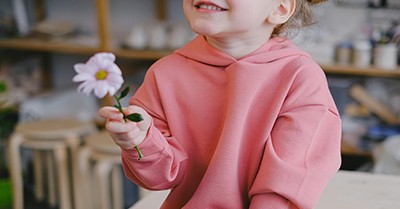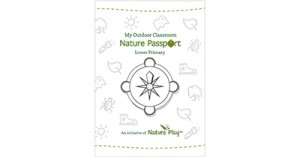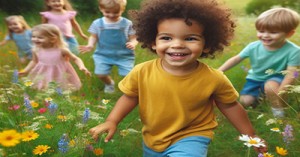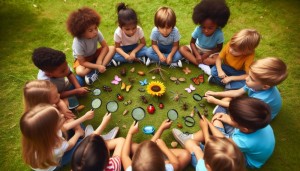There are so many wonderful ways to help children connect with nature and understand its importance! Here are a few engaging experiences you can implement in an early childhood setting.
- Nature Scavenger Hunt – Create a list of natural items (like leaves, rocks, or feathers) for children to find. This encourages exploration and observation skills.
- Gardening Together – Let children plant flowers, vegetables, or herbs. This teaches responsibility and helps them appreciate the process of growth.
- Mud Kitchen Play – Set up a play area with pots, pans, and mud for creative cooking. This messy but fun activity encourages sensory exploration.
- Leaf Rubbing Art – Place leaves under paper and rub with crayons to make leaf prints. This fosters creativity while exploring textures in nature.
- Building Fairy Houses – Use sticks, leaves, and other natural materials to create tiny homes for fairies. This sparks imagination and appreciation for natural materials.
- Nature Journaling – Have children draw or write about their observations and experiences in nature. This helps them reflect on their surroundings.
- Exploring Flowers – Engage children in sensory play with petals, leaves, and natural scents. Activities like making flower tea or creating nature glitter can be fun and educational.
- Rock Painting – Paint rocks with various designs and use them for decoration or games. This blends art and nature beautifully.
-
Forest Walks & Tree Identification – Take children on nature walks and teach them how to identify different trees and plants. This builds observation skills and appreciation for biodiversity.
-
Wildlife Spotting & Birdwatching – Encourage children to observe birds, insects, and small animals in their surroundings. They can use binoculars and keep a log of their sightings.
-
Nature-Based Storytelling – Read or create stories inspired by nature. This helps children connect emotionally with the environment.
-
Outdoor Science Experiments – Conduct simple experiments like testing soil pH, observing water absorption in plants, or studying the effects of sunlight on leaves.
- Building Bug Hotels – Create small shelters using twigs, leaves, and stones to attract insects. This teaches children about ecosystems and the role of insects in nature.
- Nature Mandalas – Arrange leaves, flowers, and stones into beautiful patterns. This encourages creativity and mindfulness.
- Eco-Friendly Art Projects – Use natural materials like clay, leaves, and recycled paper to create artwork, reinforcing sustainability.
- Weather Observation & Cloud Watching – Teach children about different cloud types and weather patterns by observing the sky.
- Outdoor Yoga & Mindfulness – Practice simple yoga poses or mindfulness exercises in nature to help children feel connected to their surroundings.
- Nature-Themed Sensory Bins—Fill bins with natural elements like sand, water, leaves, and stones for sensory exploration.
Further Reading
Nature Play Week Activities For Children
How Does Nature Affect A Child's Development
Nature Programs In Early Childhood Setting
Incorporating Natural Materials In The Learning Environment
Learning With Nature







 Open ended questions cannot be responded to with one word answers such as yes or no. These types of questions enables a child to provide
Open ended questions cannot be responded to with one word answers such as yes or no. These types of questions enables a child to provide During your child’s preschool years, an important milestone begins to emerge. This is the development of pre-writing skills. Pre-writing skills are used to encourage, develop
During your child’s preschool years, an important milestone begins to emerge. This is the development of pre-writing skills. Pre-writing skills are used to encourage, develop Open ended materials enables children to play freely. They are objects that have no rules to follow, use or function. Raw materials that can be
Open ended materials enables children to play freely. They are objects that have no rules to follow, use or function. Raw materials that can be An Acknowledgment of the Country is a way of showing respect for the Traditional Owners and can be given by both non-Indigenous people and Aboriginal
An Acknowledgment of the Country is a way of showing respect for the Traditional Owners and can be given by both non-Indigenous people and Aboriginal Language plays an important role in a child’s development. It enables a child to communicate effectively with their family, learn at school, socialize with friends,
Language plays an important role in a child’s development. It enables a child to communicate effectively with their family, learn at school, socialize with friends, Like adults, children have to deal with their own stress in life. Moving house, starting a new school, preparing for a new sibling - these are
Like adults, children have to deal with their own stress in life. Moving house, starting a new school, preparing for a new sibling - these are Playdough is such a versatile material. It provides numerous benefits to children as they manipulate it, it is safe and soothing and provides children with
Playdough is such a versatile material. It provides numerous benefits to children as they manipulate it, it is safe and soothing and provides children with Teaching children about sustainability enables them to appreciate and respect the natural environment. Early childhood services can provide meaningful hand on learning experiences in order
Teaching children about sustainability enables them to appreciate and respect the natural environment. Early childhood services can provide meaningful hand on learning experiences in order Recycling is an important concept that teaches children to care for the environment. It encourages children to be responsible and show a growing appreciating for
Recycling is an important concept that teaches children to care for the environment. It encourages children to be responsible and show a growing appreciating for When children apply paint to paper, glue things together, or pound a lump of clay, they experiment with colour, shape design and texture.
When children apply paint to paper, glue things together, or pound a lump of clay, they experiment with colour, shape design and texture.



